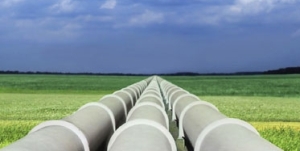Baltic States – CIS, Direct Speech, Energy, EU – Baltic States, Gas
International Internet Magazine. Baltic States news & analytics
Monday, 30.06.2025, 23:19
The more gas pipelines the better for Europe
 Print version
Print version |
|---|
Gas can flow freely within the EU internal gas market, and consumers have a choice of suppliers. Analysis by the European energy regulator shows that wholesale gas prices have converged across Europe indicating that competition is not limited to a few countries.
Suppliers to the EU have to ensure that their gas is competitively priced if they are to retain market share.
At the same time the size and openness of the EU market has made it attractive to suppliers from many different countries, a significant development given the EU’s growing dependence on gas imports. Traditional pipeline supply countries like Norway, Algeria and Russia remain important, but they can only sell their gas if it is competitive with each other and also with suppliers of Liquefied Natural Gas (LNG) delivered by ship from countries such as the US, Qatar, Nigeria, Trinidad. In practice LNG tends to be more expensive than pipeline gas which may limit European demand for it. Many other countries, such as China, also compete to buy LNG and do not have the alternative of pipeline gas supplies. So if Europe wants to buy LNG it must be prepared to pay the price.
But even if LNG does not come to Europe, the threat of it keeps other suppliers to Europe on their toes. Europe has enough LNG import capacity to supply nearly half its total needs, but only about one quarter of this is currently used as Europe has been buying more pipeline gas instead. This spare import capacity, coupled with liquid traded markets, makes it very easy for LNG suppliers to send cargoes to Europe if the price is right. The global LNG market in effect sets the ceiling price for gas in the European market.
The dependence on import increases
How has the EU achieved this? Via well considered regulation of the gas market and policies designed to improve interconnections between national markets. The Third Energy Package was introduced in 2009 after detailed analysis of the means needed to make the EU gas market competitive. Its rules ensure that all gas supply companies have access to the European pipeline network on an equal basis, and cannot stop other competitors from using those pipelines to access customers. Other EU rules require all pipelines to be able to flow gas in both directions, and that countries have sufficient infrastructure to cope with supply disruption. The EU itself has provided funds for investing in new interconnections between countries.
These different policies have reinforced each other. An open market encourages new suppliers which both improves security of supply and competition by giving buyers of gas more choice. More physical interconnections ensure all suppliers can access different countries not just those companies which have been the traditional supplier in the past. Countries can access gas from different suppliers to the EU, even if they do not have their own import pipeline connections or LNG import terminal.
The recent settlement of the EU anti-trust case against Gazprom has further reinforced this trend. Gazprom is required to offer customers in Eastern Europe prices based on Western European traded gas prices. So even if the current price convergence across Europe went into reverse, Eastern European customers would still be able to benefit from competition between suppliers to Western Europe.
What should the EU do now? Some countries have yet to fully implement the rules and some interconnections are yet to be built, for example the line between Poland and Lithuania. The EU should focus on these areas as a priority to build on the gains already achieved. Any new proposed rules should be subject to thorough analysis (which has not been the case for recent proposals to amend the current rules). Because the EU is becoming increasingly import dependent, the EU should also encourage all new infrastructure which can import gas to the EU, both pipelines such as Nord Stream 2, and LNG import terminals. The EU has successfully created a market where suppliers have to compete to supply Europe; it should have faith in that market to produce economic benefits for European consumers, rather than try and pick winners. As the gas price is set by competition between suppliers, it is investors who take the risk if no one uses their pipelines or LNG terminals, not European taxpayers. And European customers have range of supply options to choose from.
Because the EU is becoming increasingly import dependent, the EU should encourage all new infrastructure which can import gas.
(Publication from Alex Barnes Linkedin profile.)








 «The Baltic Course» Is Sold and Stays in Business!
«The Baltic Course» Is Sold and Stays in Business!

